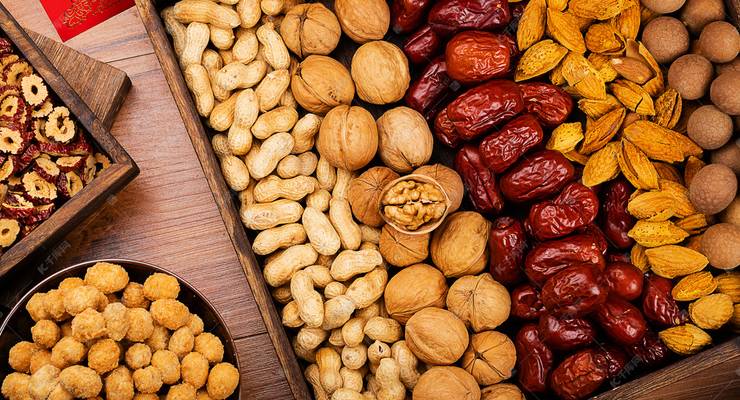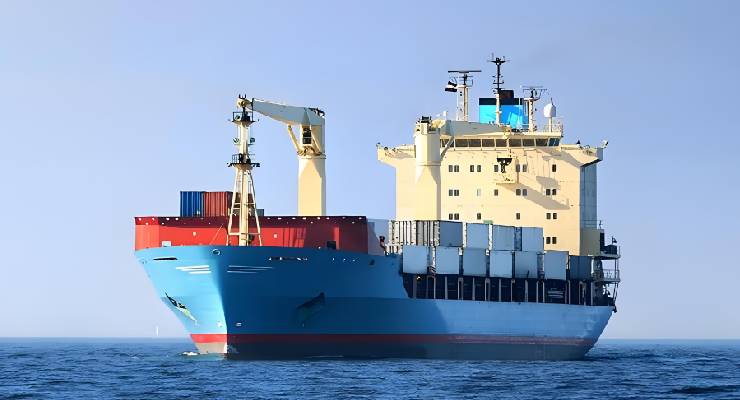
Transporting nuts sounds easy, but there are some important things to understand. Whether you're a seller who wants to ship these goods to customers, or just curious about how it works, this guide has you covered. We will ensure that your nuts arrive safely from packing to shipping. Finally, you will learn how to ship nuts to the Emirates.
Ready to simplify your transportation needs to and from Dubai? Choose Winsail, your trusted freight forwarding partner. Start experiencing hassle-free logistics solutions today!
Carry nuts
There are many kinds of dried fruits, such as macadamias, pistachios and pecans. Each requires special treatment to keep it fresh. Knowing the type helps to pack and store correctly.
Transporting nuts requires careful planning. Popular for their sweetness and health benefits, these delicious snacks require special care during transportation. This guide will explore the details of transporting these delicious products.
Choose the right packing material
When transporting nuts, choosing the right packaging material is one of the most important aspects. The choice of packaging materials plays a major role in maintaining the freshness, quality and overall appeal of the product. In this section, we will explore the importance of packaging in maintaining freshness and the various packaging materials available.
The importance of packaging to maintain freshness
Packaging is the first line of defense against external factors that affect the quality of dried fruits and dates during transportation. Maintaining freshness is critical and has a direct impact on customer satisfaction and repeat business. Packaging is important for the following reasons:
Moisture resistance: Packaging materials form a barrier to protect your product from moisture, preventing the product from becoming too wet or too wet, which can lead to spoilage.
Preserve flavor and aroma: Proper packaging prevents the loss of essential oils and flavors, ensuring that your nuts retain their flavor and aroma when they reach your customers.
Anti-contamination: Packaging protects against dust, dirt and external contaminants, ensuring that your products are hygienic and safe to eat.
Extend shelf life: Quality packaging can extend the shelf life of products, reduce waste and enhance the appeal of products to customers.
Type of packaging material
There are a variety of packaging materials to choose from, each material has its own advantages, suitable for different products. Here are some common nut filling ingredients:
Plastic bags: Polyethylene bags are cheap and can be found everywhere. Its moisture resistance is good, suitable for bulk and individual packaging.
Vacuum sealed bags: Vacuum sealed bags draw out the air in the package, preventing oxidation and maintaining freshness. Vacuum sealed bags are ideal for long-distance transportation.
Aluminum foil bag: Aluminum foil bag can effectively block water, light and oxygen. They are ideal for protecting fragile dried fruit and dates.
Kraft paper bag: Kraft paper is an environmentally friendly material that is often chosen by brands that pursue a beautiful and natural appearance. Although the moisture resistance of kraft paper is not as good as other materials, they are suitable for shorter transit times.
Cartons and cartons: Sturdy cardboard boxes are suitable for carrying large quantities of goods and provide additional protection during transportation. They are usually used for wholesale transportation.
In conclusion, choosing the right packaging material is crucial to ensure the quality and freshness of nuts during transportation. When choosing packaging, consider the unique requirements of the product, transportation conditions and environmental concerns. Doing so keeps customers satisfied, reduces waste, and contributes to a more sustainable future.
Transport mode and precautions
Transporting nuts requires careful planning and consideration of various factors to ensure that your product arrives at its destination in the best possible condition. This section will discuss the choice between domestic and international transport, the importance of transport time and temperature sensitivity, and how to choose the right transport partner.
1. Domestic and international transportation
Domestic Transportation:
Advantages: Domestic shipping involves transporting your products within the same country. It is generally more direct, with shorter transit times, lower shipping costs, and less customs and regulatory complexity.
Use case: Consider domestic shipping for local or regional distribution where your target market is primarily in your country.
International Transportation:
Advantage: International shipping allows you to expand into global markets. It can open up new opportunities for your nuts. However, it presents unique challenges such as customs clearance, international regulations and longer shipping times.
Use Case: Choose international shipping when you want to enter the international market and are willing to solve the complex problems involved.
2. Transport time and temperature sensitivity
Delivery time: The length of transport time greatly affects the quality of the nuts. The longer the transport time, the greater the risk of moisture absorption, heat and potential spoilage.
The solution: Choose faster modes of transportation, especially international transportation. Consider using express or expedited services to minimize shipping times.
Temperature sensitivity:Nuts are sensitive to temperature fluctuations. Exposure to extreme heat or cold can affect its quality and shelf life.
Solution: Use temperature-controlled transport options, such as refrigerated or insulated containers, if necessary. Make sure your packaging provides some level of protection against temperature changes.
Choosing the right transportation partner is a critical decision that can significantly impact your business success. Here's how to choose the right partner:
Reliability:
Find a shipping partner with a proven track record and on-time delivery. Review customer reviews and request references when needed.
Food Transportation Experience:
Work with a transportation company experienced in handling food. They should be aware of the specific requirements and regulations related to food transportation.
Global network:
If you plan to ship internationally, consider choosing a shipping partner that has a global network and is well versed in international customs and regulations.
Cost considerations:
Compare shipping and fees from multiple suppliers to ensure you get a competitive price that fits your budget.
Customer Support:
Good customer support is crucial. Choose a shipping partner that responds to your inquiries and updates your shipping information in a timely manner.
Insurance coverage:
Ask about insurance options to protect your product in the event of unforeseen events, such as damage or loss in transit.
In conclusion, careful consideration of domestic and international transport, monitoring of transport time and temperature sensitivity, and selecting the right transport partner are all crucial steps when transporting nuts. By making smart choices in these areas, you can ensure that your products are delivered to your customers in the best possible condition, whether nearby or halfway around the world.

Regulatory and legal considerations
When transporting nuts, it is essential to comply with various regulatory and legal requirements to ensure product safety, quality and compliance. This section will discuss important areas of import and export regulations, labeling requirements, and food safety compliance that you must be aware of.
1. Import and export regulations
Import regulations:
When you import nuts into a country, you must comply with the import regulations of that country. These regulations can vary widely from country to country, including restrictions on certain nuts from specific regions due to pests or diseases.
It is essential to research and understand the import regulations of the target country and ensure that your products meet these requirements.
Export Regulations:
Similarly, if you are exporting nuts to other countries, you need to be aware of your own country's export regulations. These regulations may involve obtaining export licenses, complying with packaging and labeling standards, and meeting destination country requirements.
Work closely with relevant government agencies and trade associations to keep abreast of the latest export regulations and ensure compliance.
2. Label requirements
Accurate labeling:
Accurate labeling of nuts is a legal requirement and is essential for consumer safety and information. Include the following on the product label:
Product name
Proportioning list
Allergen warning
Net weight or quantity
Expiration date or best before date
Country of origin
Nutrition Facts List (if required)
Contact information for your company
Language and localization:
Consider the language preferences of your target market. In some countries, labeling in the local language or multiple languages may be required.
Allergen disclosure:
Disclose any allergens present in nuts. Ensure that allergen information is displayed accurately and prominently.
3. Food safety compliance
HACCP principles:
Implement hazard analysis and Critical Control Point (HACCP) principles during production and packaging. HACCP is a systematic approach to food safety used to identify and control potential hazards.
Good Manufacturing Practice (GMP) :
Comply with GMP standards to ensure that your facilities, equipment and personnel are kept clean and hygienic during production and packaging.
Traceability and Recall Plan:
Build a robust traceability system that allows you to track the origin and distribution of your products. This is critical for product recalls or safety issues.
Regular audits and inspections:
Conduct regular internal audits and inspections to ensure that your operations comply with food safety regulations. You may also be subject to inspection by regulatory authorities.
Staff training:
Train employees in food safety practices to ensure they understand the importance of hygiene and quality control.
Regulatory and legal considerations are crucial when transporting nuts. Complying with import and export regulations, meeting labeling requirements and maintaining food safety compliance helps you avoid legal issues, build trust with your customers and ensure the quality and safety of products on the market. Stay informed about the regulations that apply to your business and proactively address compliance issues to succeed in the industry.
Importing and exporting nuts to the UAE
If you are interested in shipping nuts to the United Arab Emirates (UAE), please consider the following specific things:
Uae regulations
The UAE has strict regulations on the import and export of food products, including nuts. Please ensure that these regulations are followed to avoid any delays or legal issues.
document
Proper documentation is crucial when shipping goods to the UAE. This may include certificates of origin, health certificates and product labels that comply with UAE standards.
Packaging and labeling
Make sure your packaging meets UAE standards and clearly labels the contents. Arabic labels may be required in addition to English labels.
Import duties and taxes
When sending nuts to the UAE, please be aware of import duties and taxes that may apply. These fees may vary by product and volume.
Work with local distributors
Consider working with a local dealer in the UAE who understands the market and can help you comply with regulations. This simplifies the process of bringing your products to the UAE market.
Ready to seamlessly ship your goods around the world?
Transporting nuts requires careful planning and execution. By understanding the unique needs of these products and following the guidelines in this guide, you can ensure that your nuts arrive intact.
Contact us today to experience hassle-free international shipping and enjoy industry expertise, global network and reliability.
-
 A Comprehensive Guide to Refrigerated ContainersJun 17,2025
A Comprehensive Guide to Refrigerated ContainersJun 17,2025 -
 Guide to 20ft & 40ft Shipping Container Dimensions for Global LogisticsJun 17,2025
Guide to 20ft & 40ft Shipping Container Dimensions for Global LogisticsJun 17,2025 -
 How to track shipments sent from ChinaMay 13,2025
How to track shipments sent from ChinaMay 13,2025 -
 Guide to Importing and Shipping Cars from China to UAEMay 13,2025
Guide to Importing and Shipping Cars from China to UAEMay 13,2025 -
 Guide to Importing and Shipping Camping Gear from ChinaMay 07,2025
Guide to Importing and Shipping Camping Gear from ChinaMay 07,2025 -
 Shipping from China to YemenMay 06,2025
Shipping from China to YemenMay 06,2025

